小学英语资料
小学英语总复习资料完整版

小学英语总复习资料完整版During XXX。
it is important to learn basic vocabulary words。
These words include school supplies like pens。
pencils。
pencil-boxes。
rulers。
books。
book bags。
erasers。
crayons。
comic books。
postcards。
newspapers。
storybooks。
notebooks。
Chinese books。
English books。
math books。
magazines。
and naries。
It is also important to learn about the human body。
including the foot。
head。
face。
hair。
nose。
mouth。
eye。
ear。
arm。
hand。
finger。
leg。
and tail。
XXX category。
including red。
blue。
yellow。
green。
white。
black。
pink。
purple。
orange。
and brown。
Children should also learn about animals。
such as cats。
dogs。
pigs。
ducks。
rabbits。
horses。
elephants。
ants。
fish。
birds。
snakes。
mice。
monkeys。
pandas。
bears。
ns。
tigers。
foxes。
zebras。
deer。
giraffes。
geese。
hens。
XXX。
lambs。
sheep。
goats。
and cows。
Lastly。
children should learn about people。
including friends。
boys。
girls。
mothers。
小学必会英语知识点总结
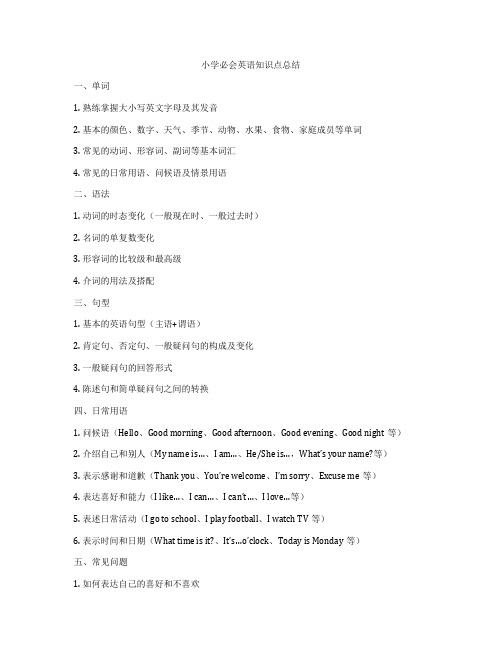
小学必会英语知识点总结一、单词1. 熟练掌握大小写英文字母及其发音2. 基本的颜色、数字、天气、季节、动物、水果、食物、家庭成员等单词3. 常见的动词、形容词、副词等基本词汇4. 常见的日常用语、问候语及情景用语二、语法1. 动词的时态变化(一般现在时、一般过去时)2. 名词的单复数变化3. 形容词的比较级和最高级4. 介词的用法及搭配三、句型1. 基本的英语句型(主语+谓语)2. 肯定句、否定句、一般疑问句的构成及变化3. 一般疑问句的回答形式4. 陈述句和简单疑问句之间的转换四、日常用语1. 问候语(Hello、Good morning、Good afternoon、Good evening、Good night等)2. 介绍自己和别人(My name is…、I am…、He/She is…,What’s your name?等)3. 表示感谢和道歉(Thank you、You’re welcome、I’m sorry、Excuse me等)4. 表达喜好和能力(I like…、I can…、I can’t…、I love…等)5. 表述日常活动(I go to school、I play football、I watch TV等)6. 表示时间和日期(What time is it?、It’s…o’clock、Today is Monday等)五、常见问题1. 如何表达自己的喜好和不喜欢2. 如何表达自己的能力和兴趣3. 如何介绍自己和别人4. 如何表达感谢和道歉5. 如何问候和打招呼6. 如何询问时间和日期六、常见情景1. 在学校的日常交际2. 家庭生活的交际3. 社交场合的交际4. 在商店购物的交际5. 在外出旅游时的交际七、其他1. 听力训练:多听英语,尝试模仿外国人的发音,锻炼自己的听力2. 朗读训练:多读英语文章,提高自己的朗读能力3. 写作训练:多写英语作文,练习自己的写作能力4. 视频学习:多观看英语教学视频,加强自己的口语表达能力以上为小学英语必知识点总结,希望能对小学生的英语学习有所帮助。
小学英语总复习资料完整版

小学英语总复习资料完整版文稿归稿存档编号:[KKUY-KKIO69-OTM243-OLUI129-G00I-FDQS58-小学期间重要词汇:学习用品(school things):pen钢笔pencil铅笔pencil-box铅笔盒ruler尺子book书bag包 schoolbag书包eraser 橡皮 crayon 蜡笔comicbook漫画书postcard明信片newspaper报纸storybook故事书notebook笔记本Chinesebook语文书Englishbook英语书mathbook数学书magazine杂志dictionary词典人体(body):foot脚head头face脸hair头发nose鼻子mouth嘴eye眼睛ear耳朵arm 手臂hand手finger手指leg腿tail尾巴颜色(colours):red红blue蓝yellow黄green绿white白black黑pink粉红purple紫orange橙brown棕动物(animals):cat猫dog狗pig猪duck鸭rabbit兔horse马elephant大象ant蚂蚁fish鱼bird鸟snake蛇mouse老鼠(mice 复数)monkey猴panda熊猫bear熊lion狮子tiger老虎fox狐狸zebra斑马deer鹿giraffe长颈鹿goose鹅hen母鸡turkey火鸡lamb小羊sheep绵羊goat山羊cow奶牛人物(people):friend朋友boy男孩girl女孩mother(mum)母亲father(dad)父亲sister 姐妹brother兄弟uncle叔叔;舅舅aunt姑姑 man男人woman女人Mr.先生Miss小姐lady女士;小姐parents父母grandparents祖父母grandma/grandmother(外)祖母grandpa/grandfather(外)祖父cousin堂(表)兄弟;堂(表)姐妹son儿子daughter女儿baby婴儿kid小孩classmate同学penpal笔友tourist旅行者people人物robot机器人职业(jobs):teacher教师student学生doctor医生nurse护士cook 厨师 driver司机farmer农民singer歌唱家writer作家actor男演员actress女演员artist画家TVreporter电视台记者engineer工程师cleaner清洁工basketballplayer篮球运动员factory worker 工厂工人 postman 邮递员 businessman 商人 post officer 警察fisherman 渔民 scientist 科学家 pilot 飞行员 coach 教练食品,饮料(food&drink):rice米饭bread面包beef牛肉milk牛奶water水egg蛋fish 鱼tofu豆腐cake蛋糕hotdog热狗hamburger汉堡包Frenchfries炸薯条cookie曲奇biscuit饼干jam果酱noodles面条meat肉chicken鸡肉pork猪肉mutton羊肉vegetable蔬菜salad沙拉sandwich 三明治soup汤ice冰ice cream冰淇淋Coke可乐juice果汁tea茶coffee咖啡breakfast早餐lunch午餐dinner/supper晚餐meal一餐水果,蔬菜(fruit&vegetables):apple苹果banana香蕉pear梨orange橙watermelon西瓜grape葡萄eggplant茄子greenbeans青豆tomato西红柿potato土豆peach桃strawberry草莓onion洋葱carrot胡萝卜cabbage卷心菜衣服(clothes):jacket夹克衫shirt衬衫T-shirt丅恤衫skirt短裙子dress连衣裙jeans牛仔裤pants长裤socks袜子shoes鞋子sweater毛衣coat上衣shorts短裤hat(有沿(de))帽子cap便帽sunglasses太阳镜tie领带scarf围巾gloves手套umbrella 雨伞 cloth布交通工具(vehicles):bike自行车bus公共汽车train火车boat小船ship轮船car小汽车taxi出租车plane飞机subway地铁on foot 步行杂物(otherthings):window窗户door门desk课桌chair椅子bed床computer计算机blackboard黑板fan风扇light灯teacher'sdesk讲台picture图画;照片wall墙壁floor地板football/soccer足球phonesofa沙发fridge冰箱table桌子TV电视key钥匙photo照片plate 盘子bowl碗knife刀fork叉spoon勺子chopsticks筷子gift礼物toy玩具key 钥匙 map地图ball球balloon气球kite风筝box盒子umbrella伞violin 小提琴menu菜单e-mail电子邮件trafficlight交通灯money钱medicine药地点(locations):home家room房间bedroom卧室bathroom卫生间livingroom起居室kitchen厨房classroom教室school学校park公园library图书馆postoffice邮局policeoffice警察局hospital医院cinema电影院bookstore书店farm农场zoo动物园办公室library图书馆gym体育馆bathroom卫生间artroom绘画教室computerroom计算机教室musicroom音乐教室TVroom电视机房company公司factory工厂petshop宠物商店naturepark自然公园themepark主题公园sciencemuseum科学博物馆theGreatWall长城supermarket超市 restaurant餐馆bank银行country国家village乡村city城市hometown家乡busstop公交车站课程(classes):Chinese class语文math class数学PE class体育课English class英语课music class 音乐课 art class 美术课国家,城市(countries&cities):China中国America/USA美国UK联合王国England英国Canada加拿大Australia澳大利亚NewYork纽约London伦敦Sydney悉尼Moscow莫斯科气象天气(weather):cold寒冷(de)warm温暖(de)cool凉爽(de) hot 热(de)snowy下雪(de)sunny晴朗(de)rainy下雨(de)windy有风(de)cloudy多云(de)weatherreport天气预报景物(nature):river河流lake湖泊forest森林road公路house房子bridge桥building建筑物rain雨cloud云sun太阳mountain山 hill 小山sky天空rainbow彩虹wind风air空气moon月亮植物(plants):flower花grass草tree树plant植物rose玫瑰leaf叶子星期(week):Monday星期一Tuesday星期二Wednesday星期三Thursday星期四Friday星期五Saturday星期六Sunday星期天weekend周末月份(months):Jan.(January)一月Feb.(February)二月Mar.(March)三月April四月May 五月June六月July七月Aug.(August)八月Sept.(September)九月Oct.(October)十月Nov.(November)十一月Dec.(December)十二月季节(seasons):spring春summer夏fall/autumn秋winter冬方位(directions):south南north北east东west西turn left(at)左边 turn right(at)右边go straight 直走患病(illness):haveafever发烧hurt疼痛haveacold感冒数词(numbers):one一two二three三four四five五six六seven七eight八nine九ten十eleven十一twelve十二thirteen十三fourteen十四fifteen十五sixteen十六seventeen十七eighteen十八nineteen十九twenty二十thirty三十forty四十fifty五十sixty六十seventy七十eighty八十ninety九十forty-two四十二hundred百one/ahundredandthirty-six一百三十六first第一second第二third第三fourth第四fifth第五eighth第八ninth第九twelfth第十二twentieth第二十thirtieth第三十形容词(adj.):big大(de)small小(de)long长(de)tall高(de)short短(de);矮(de)young年轻(de)old旧(de);老(de)strong健壮(de)friendly 有好(de)thin瘦(de)fat胖(de) active积极活跃(de)quiet安静(de)nice好看(de)kind和蔼亲切(de) polite 有礼貌(de) hard-working 工作努力(de) shy 害羞(de)strict严格(de)clever聪明(de)funny滑稽可笑(de)tasty好吃(de)sweet甜(de)salty咸(de)sour酸(de)fresh 新鲜(de) hot 辣(de) delicious 美味(de)favourite最喜爱(de)clean干净(de)tired疲劳(de)angry生气(de) happy高兴(de)sad忧愁(de)good好(de)fine好(de)great很好(de)heavy重(de)new新(de)happy快乐(de)right对(de)hungry饥饿(de)thirsty 渴(de)cute逗人喜爱(de)little小(de)lovely可爱(de)beautiful漂亮(de)colourful色彩鲜艳(de)pretty漂亮(de)cheap便宜(de)expensive昂贵(de)juicy多汁(de)tender嫩(de)healthy健康(de)ill有病(de)helpful有帮助(de)high高(de)easy简单(de)proud骄傲(de)taller更高(de)shorter更矮(de)stronger更强壮(de)older年龄更大(de)younger更年轻(de)bigger更大(de)heavier更重(de)longer更长(de)thinner更瘦(de)smaller更小(de)better更好(de)(good 和well (de)比较急higher更高(de)介词(prep.):in在……里on在……上;在……时候under在……下面near在……(de)旁边behind在……后边nextto与……相邻over在……上面infrontof在……前面above 在……上面 between 在……中间 beside 在旁边动词(v.):get(gets, got) up 起床 go(goes, went) to school去上学 go home 回家go to bed 上床睡觉 wash( washes, washed)my clothes 洗我(de)衣服 watch( watches, watched)TV 看电视 do(does, did) homework 做作业 read(reads, read) books 看书play( plays, played)踢足球 play basketball 打篮球 play ping-pong 打乒乓球play badmiton 打羽毛球 play the pipa 弹琵琶 do kungfu 练功夫 draw(draws, drew) cartoons 画漫画 cook(cooks, cooked)烹饪 swim( swims, swam) go swimming 游泳speak(speaks, spoke) English 说英语 eat(eats, ate) breakfast 吃早饭 have(has, had)…class 上……课 play sports 进行体育运动 do morning exercises 做早操 eat dinner 吃晚饭 clean(cleans, cleaned) my room 打扫我(de)房间 go for a walk 散步go shopping 去购物 take(takes, took) a dancing class 上舞蹈课 go on a picnic去野餐 pick(picks, picked) apples 摘苹果 make(makes, made) a snowman 堆雪人turn(turns, turned) left 向左转 turn right 向右转 slow down 慢下来 stop(stops, stopped)停下 visit(visits, visited) my grandparents 拜访我(de)外祖父母see(sees, saw) a film 看电影 take a trip 去旅行 go to the supermarket 去超市cook Chineses food 做中国菜 study(studies, studied) Chinese 学习中文 do word puzzles 猜字谜 go hiking 去远足see a doctor 看医生 do more exercise 做更多(de)锻炼 wear(wears, wore) warm clothes 穿厚点 take a deep breath 深呼吸 count toslept) 睡觉 go camping 野营 go fishing 去钓鱼 ride(rides, rode) a horse 骑马hurt(hurts, hurt) my foot 伤了脚 take pictures 照相 buy(buys, bought) gifts 买礼物 go cycling 骑自行车 ice-skate = go ice-skating =go skating 滑冰小学期间重要句型特殊疑问句Where are you from 你是哪里人I’m from the UK. 我是英国人.Where is my pencil box 我(de)铅笔盒在哪It’s in your desk. 在你(de)桌子里. Where is it 它在哪It’s near the window. 就在窗户旁边.Where are the keys 钥匙在哪Where is the teachers’ office 教师(de)办公室在哪里It’s on the second floor. 它在二楼.Where is the museum shop 博物馆商店在哪里It’s near the door. 在大门附近. Where are you going 你们打算去哪We’re going to the cinema. 我们打算去电影院. Where does he work 他在哪工作 He works at sea. 他在海上工作.Where did you go 你去了哪里Who’s that man 那位男士是谁He’s my father. 他是我(de)爸爸.Who’s he 他是谁Whose coat is this 这是谁(de)外套It’s mine. 它是我(de).Whose pants are those 那条裤子是谁(de) They are your father’s. 它们是你爸爸(de).Whose is it 这是谁(de) It’s Zhang Peng’s. 是张鹏(de).What’s your/his name 你叫什么名字My/His name’s John. 我叫约翰.What’s this/that 这/那是什么It’s a duck. 它是只鸭子.What are these/those 这些/那些是什么They’re tomatoes.What’s in your schoolbag 你(de)书包里有什么What colour is it 什么颜色(de) It’s blue and white. 是蓝白色(de).What’s for dinner 晚餐吃什么What would you like 你想吃什么I’d li ke (I would like)some soup and bread. 我想要汤和面包. What would you like to eat 你想吃什么 A sandwich, please. 请给我一个三明治. What would you like to drink 你想喝什么I’d like some water. 我想喝点水.What’s your favourite food 你最喜欢吃什么食物Noodles. They’re delicious. 面条.面条很好吃.W hat’s your aunt’s job 你婶婶做什么工作She’s a nurse. 她是为护士.What tiime is it 几点了It’s 6 o’clock. 六点了.What’s the weather like in New York纽约天气怎么样It’s rainy. 是下雨天.What are they doing 他们在干什么They’re eating lunch. 他们在吃午饭. What’s the little monkey doing 那只小猴子在干什么It’s playing with its mother. 它在和妈妈玩耍. What’s he like 他什么样He’s kind. 他很和蔼. What do you have on Thursdays 星期四你有什么课 I have math, English, and music.What can you do for the party, children 孩子们,你们能为联欢会做什么呢I can sing English songs. 我会唱英语歌.What are you going to do tomorrow 你明天打算做什么I’m going to have an art lesson. 我要上美术课.What are Peter’s hobbies 彼得有什么爱好 He likes reading stories. 他喜欢读故事.What does he do 他是做什么(de) He’s a businessman. 他是商人.What’s wrong(with+某人) (某人)怎么了 Your father is ill. 你爸爸病了. What did you do last weekend 你上周末干了什么 What happened 怎么了How are you 你好吗I’m fine, thank you. 我很好,谢谢你.How old are you 你几岁了I’m six years old. 我六岁了.How many plates (你要)几个盘子How many kites do you see 你看见了多少只风筝How many crayons do you have 你有多少只蜡笔How many people are there in your family, Chen Jie 你家有几口人,陈洁My family has six people. 我家有6口人.How do you like this skirt 这条短裙你觉得怎么样It’s very pretty. 它很漂亮. How much is this skirt 这条短裙多少钱It’s $89. 它89美元.How do you come to school 你怎么来学校(de) Usually, I come on foot. 通常我走路来.How does he go to work 他怎么上班 He goes to work by bike. 他骑自行车上班. How tall are you 你多高I’m 1.65 meters. 我身高1.65米.How heavy are you 你多重I’m 48kilograms. 我体重48公斤.How was your weekend 你周末过得怎么样 It was good, thank you. 很好,谢谢.How did you go there 你们怎么去(de) We went there by plane. 我们坐飞机去(de). How do you know that 你怎么知道(de)When is the party 聚会在什么时候It’s in April. 在4月.When is the trip this year 今年(de)秋游在什么时候It’s in October. We’ll go to the Great Wall. 在10月. 我们将去长城.When is April Fool’s Day 愚人节是哪天It’s on April 1st. 它在4月1日.When is your birthday 你(de)生日是哪天 My birthday is on April 4th .When are you going 你们什么时候去When do you finish class in the morning 你们上午(de)课几点结束We finish class at 1 o’clock. 我们1点钟结束上午(de)课.Which season do you like best = What’s your favourite season 你最喜欢(de)季节是什么Winter.= I like winter. =I like winter best. = winter is my favourite season. Why 为什么 Because I like summer vacation. 因为我喜欢暑假.一般疑问句Is she your mother 她是你(de)妈妈吗 Yes, she is. 是(de),她是. No, she isn’t. 不,她不是.Is it in your bag 在你(de)包里吗No, it isn’t. 不,没有在我包里.Is she in the living room 她在客厅里吗No, she isn’t. 不,她不在.Is this the teachers’ office 这是教师办公室吗No, it isn’t. The teachers’ office is next to the library. 不,不是.教师办公室挨着图书馆.Is that the computer room 那是计算机房吗Is it cold 天冷吗No, it isn’t. 不,不冷.Is he young 他年轻吗No, he isn’t. 不,他不年轻.Is he drinking water 它在喝水吗No, he isn’t. He’s eating. 不是.它在吃东西. Is there a river in the forest, Miss White 怀特小姐,森林里有河吗No, there isn’t.不,森林里没有河.Are there any tall buildings in the nature park 自然公园里有高楼吗No, there aren’t. 不,自然公园里没有高楼.Are they on the table 它们在桌子上吗No, they aren’t. They’re in the door. 不,不在.它们在门上.Are these carrots 这些是胡萝卜吗 Yes, they are. 是(de).Are they hens 它们是母鸡吗No, they aren’t. They’re ducks. 不,不是.它们是鸭子.Are these yours 这(双鞋)是你(de)吗No, they aren’t. 不,不是.Are these all ours 这些都是我们(de)吗Can I have some water, please 请给我些水好吗Can I go outside now 现在我能出去吗Yes, you can. / No, you can’t. 可以/不可以.Can I try them on 我能试试吗Can you do any kung fu, Jhon 约翰,你会武术吗 Yes, I can. 是(de),我会武术. Could you see stars at night 在晚上你可以看到星星吗 Yes, I could. 可以.Would you like a knife and fork 你想要刀和叉吗 Yes, please.Do you like oranges 你喜欢橙子吗Yes, I do./ No, I don’t. 是(de),我喜欢./不,我不喜欢.Do you have a library 你们有一个图书馆吗 Yes, we do. 是(de),有.Do you often read books in the park 你经常在这个公园里看书吗No, I don’t. 不, 我不经常在这里看书.Does he live in Sydney 他住在悉尼吗No, he doesn’t. 不,他没有.Does he like doing word puzzles and go hiking 他喜欢猜字谜和远足吗Yes, he does. 是(de),他喜欢.Did you do anything else 你还做了其他什么事吗Yes, I cleaned my room and washed my clothes. 是(de),我到扫了房间,还洗了衣服. Did you see a film 你看电影了吗No, I had a cold. I stayed at home all weekend and slept. 没有,我感冒了.整个周末都待在家睡觉.Did you go to Turpan 你们去吐鲁番了吗Yes, we did./ No, we didn’t. 是(de),我们去了./ 不,我们没去.陈述句It’s so tall 它好高啊 Come here, children 到这里来,孩子们I have a ruler/ an eraser. 我有一把尺子/ 一块橡皮.It has a long nose. 它有长鼻子. It has small eyes and big ears. 它有小眼睛和大耳朵.We have a new classroom. 我们有间新教室.He has glasses and his shoes are blue. 他戴眼镜,穿蓝色(de)鞋子.My family has six people. 我家有6口人.I can use chopsticks. 我会用筷子.It’s time for breakfast/English class. 是时候吃早饭了/上英语课了.It’s time to go home/get up. 是时候回家/起床了.It’s cold outside. 外面冷. It’s rainy. 是下雨天. It’s 26 degrees. 是26度.There is a big bed. (这里)有一张大床.There are so meny pictures here. 这里有这么多幅画.There was no library in my old school. 我以前(de)学校没有图书馆.There were no computers or Internet in my time. 我那时候没有电脑也没有网络. The yellow picture is mine. 那副黄颜色(de)画是我(de).In the USA people on bikes must wear one. 在美国骑自行车(de)人必须戴(头盔 a helmet).I must pay attention to the traffic nights. 我必须注意交通信号灯.We are going to draw some pictures in Renmin Park. 我们要到人民公园去画画. They are afraid of him. 它们害怕它.The cat is angry with them. 这只猫很生它们(de)气.He should see a doctor this morning. 他今天早上应该去看医生.That’s the tallest dinosaur in this hall. 那是这个厅里最高(de)恐龙.It’s taller that both of us together. 它比我俩加起来还高.I want to buy the new film magazine. 我想买期新(de)电影杂志.Before, I was quiet. Now, I’m ver y active in class. 以前,我很安静.现在我在课堂上很活跃.I was short, so I couldn’t ride my bike well. Now, I go cycling every day.我以前个子小,自行车骑不好.现在我天天骑车.I don’t like grapes. 我不欢葡萄.Me, neither. 我也不喜欢.(祈使句)Look at me 看我Have a good time 玩开心点儿Have some bread. 吃点面包吧.Talk quietly. 小声讲话.Keep your desk clean. 保持桌面整洁.Open it and see 打开看看Tell us about your school, please. 请给我们讲讲您(de)学校吧.Let’s go home 我们回家吧Honey, let’s buy some fruit. 宝贝儿, 我们买点水果吧.Let’s go to school 我们一起回家吧Let’s make a puppet (让)我们一起做个木偶吧Let’s go and se e 我们去看看吧Let’s clean the classroom 我们打扫教室吧Let me clean the windows. 我来擦窗户.Don’t go at rhe red light 别闯红灯Don’t be sad. 别伤心.Sounds great 听起来不错Silly me 我真傻时间名词前所用介词(de)速记歌年月周前要用in,日子前面却不行.遇到几号要用on,上午下午又是in.要说某日上下午,用on换in才能行.午夜黄昏须用at,黎明用它也不错.at也用时分前,说“差”可要用上to,说“过”只可使用past,多说多练牢牢记,莫让岁月空蹉跎.小学英语语法复习要点一、名词复数规则1.一般情况下,直接加-s,如:book-books, bag-bags, cat-cats, bed-beds2.以s. x. sh. ch结尾,加-es,如:bus-buses, box-boxes, brush-brushes,watch-watches3.以“辅音字母+y”结尾,变y为i, 再加-es,如:family-families, strawberry-strawberries4.以“f或fe”结尾,变f或fe为v, 再加-es,如:knife-knives5.不规则名词复数:man-men, woman-women, policeman-policemen, policewoman-policewomen, mouse-micechild-childrenfoot-feet,.tooth-teethfish-fish, people-people,Chinese-Chinese, Japanese-Japanese二、一般现在时一般现在时基本用法介绍No. 1一般现在时(de)功能1.表示事物或人物(de)特征、状态.如:The sky is blue.天空是蓝色(de).2.表示经常性或习惯性(de)动作.如:I get up at six every day.我每天六点起床.3.表示客观现实.如:The earth goes around the sun.地球绕着太阳转.一般现在时(de)构成1. be动词:主语+be(am,is,are)+其它.如:I am a boy.我是一个男孩.2.行为动词:主语+行为动词(+其它).如:We study English.我们学习英语.当主语为第三人称单数(he, she,it)时,要在动词后加"-s"或"-es".如:Mary likes Chinese.玛丽喜欢汉语.一般现在时(de)变化1. be动词(de)变化.否定句:主语+ be + not +其它.如:He is not a worker.他不是工人.一般疑问句:Be +主语+其它.如:-Are you a student-Yes. I am. / No, I'm not.特殊疑问句:疑问词+一般疑问句.如:Where is my bike2.行为动词(de)变化.否定句:主语+ don't( doesn't ) +动词原形(+其它).如:I don't like bread.当主语为第三人称单数时,要用doesn't构成否定句.如:He doesn't often play.一般疑问句:Do( Does ) +主语+动词原形+其它.如:- Do you often play football- Yes, I do. / No, I don't.当主语为第三人称单数时,要用does构成一般疑问句.如:- Does she go to work by bike- Yes, she does. / No, she doesn't.特殊疑问句:疑问词+一般疑问句.如:How does your father go to work动词+s(de)变化规则1.一般情况下,直接加-s,如:cook-cooks, milk-milks2.以s. x. sh. ch. o结尾,加-es,如:guess-guesses, wash-washes, watch-watches, go-goes3.以“辅音字母+y”结尾,变y为i, 再加-es,如:study-studies三、现在进行时1.现在进行时表示现在正在进行或发生(de)动作,也可表示当前一段时间内(de)活动或现阶段正在进行(de)动作.2.现在进行时(de)肯定句基本结构为be+动词ing.3.现在进行时(de)否定句在be后加not.4.现在进行时(de)一般疑问句把be动词调到句首.5.现在进行时(de)特殊疑问(de)基本结构为:疑问词不达意 + be + 主语 + 动词ing 但疑问词当主语时其结构为:疑问词不达意 + be + 动词ing动词加ing(de)变化规则1.一般情况下,直接加ing,如:cook-cooking2.以不发音(de)e结尾,去e加ing,如:make-making, taste-tasting3.如果末尾是一个元音字母和一个辅音字母,双写末尾(de)辅音字母,再加ing,如:run-running, stop-stopping四、一般将来时一、概念:表示将要发生(de)动作或存在(de)状态及打算、计划或准备做某事.句中一般有以下时间状语:tomorrow, next day(week, month, year…),soon, the day after tomorrow(后天)等.二、基本结构:①be going to + do;②will+ do.三、否定句:在be动词(am, is, are)后加not或情态动词will后加not成won’t.例如:I’m going to have a picnic this afternoon.→ I’m not going to have a picnic this afternoon.四、一般疑问句: be或will提到句首,some改为any, and改为or,第一二人称互换.例如:We are going to go on an outing this weekend. → Are you going to go on an outing this weekend五、对划线部分提问.一般情况,一般将来时(de)对划线部分有三种情况.1. 问人.Who 例如:I’m going to New York soon. →Who’s going to New York soon.2. 问干什么.What … do.例如: My father is going to watch a race with me this afternoon. →What is your father going to do with you this afternoon.3. 问什么时候.When.例如:She’s going to go to bed at nine. →When is she going to bed六、同义句:be going to = willI am going to go swimming tomorrow(明天). = I will go swimming tomorrow.五、一般过去时1.一般过去时表示过去某个时间发生(de)动作或存在(de)状态,常和表示过去(de)时间状语连用.一般过去时也表示过去经常或反复发生(de)动作感谢.2.Be动词在一般过去时中(de)变化:⑴am 和is在一般过去时中变为was.(was not=wasn’t)⑵are在一般过去时中变为were.(were not=weren’t)⑶带有was或were(de)句子,其否定、疑问(de)变化和is, am, are一样,即否定句在was或were后加not,一般疑问句把was或were调到句首.3.句中没有be动词(de)一般过去时(de)句子否定句:didn’t +动词原形,如:Jim didn’t go home yesterday. 一般疑问句:在句首加did,句子中(de)动词过去式变回原形.如:Did Jim go home yesterday 特殊疑问句:⑴疑问词+did+主语+动词原形如:What did Jim do yesterday⑵疑问词当主语时:疑问词+动词过去式如:Who went to home yesterday动词过去式变化规则:1.一般在动词末尾加-ed,如:pull-pulled, cook-cooked2.结尾是e加d,如:taste-tasted3.末尾只有一个元音字母和一个辅音字母(de)重读闭音节,应双写末尾(de)辅音字母,再加-ed,如:stop-stopped4.以“辅音字母+y”结尾(de),变y为i, 再加-ed,如:study-studied六、形容词和副词(de)比较级复习及练习一、形容词(de)比较级1、形容词比较级在句子中(de)运用:两个事物或人(de)比较用比较级,比较级后面一般带有单词than.比较级前面可以用more, a little 来修饰表示程度.than后(de)人称代词用主格(口语中可用宾格).2.形容词加er(de)规则:⑴一般在词尾加er ;⑵以字母e 结尾,加r ;⑶以一个元音字母和一个辅音字母结尾,应双写末尾(de)辅音字母,再加er ;⑷以“辅音字母+y”结尾,先把y变i,再加er .3.不规则形容词比较级:good,well -better, beautiful-more beautiful七、There be 句型与have, has(de)区别1、There be 句型表示:在某地有某物(或人)2、在there be 句型中,主语是单数,be 动词用is ; 主语是复数,be 动词用are ; 如有几件物品,be 动词根据最靠近be 动词(de)那个名词决定.3、there be 句型(de)否定句在be 动词后加not , 一般疑问句把be 动词调到句首.4、there be句型与have(has) (de)区别:there be 表示在某地有某物(或人);have(has) 表示某人拥有某物.5、some 和any 在there be 句型中(de)运用:some 用于肯定句, any 用于否定句或疑问句.6、and 和or 在there be句型中(de)运用:and 用于肯定句, or 用于否定句或疑问句.7、针对数量提问(de)特殊疑问句(de)基本结构是: How many + 名词复数 + are there + 介词短语 How much + 不可数名词 + is there + 介词短语八、人称代词和物主代词1、人称代词主格和宾格(de)区别:主格通常位于句中第一个动词之前(有时候位于than 之后),宾格一般位于动词或介词之后.2、物主代词形容词性与名词性(de)区别:形容词性用时后面一般要带上名词,名词性则单独使用,后面不带名词.代词用法:主格做主语宾格放在动词和介词后形容词性物主代词能力差,后面需把名词加;名词性物主代词能力好,自己独来又独往.。
人教版新版小学六年级英语上册全册学习资料
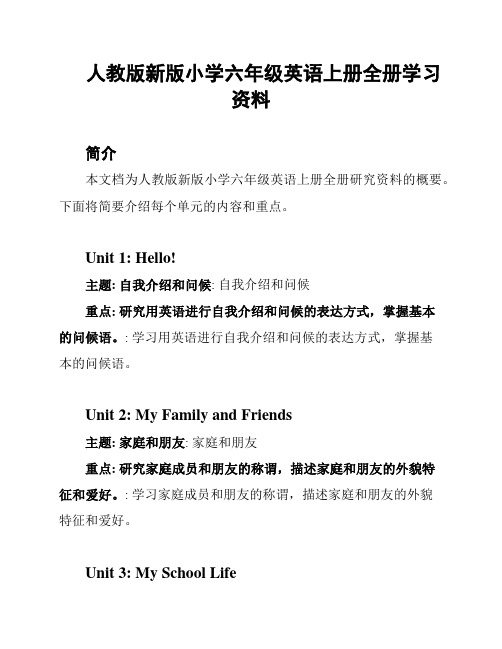
人教版新版小学六年级英语上册全册学习资料简介本文档为人教版新版小学六年级英语上册全册研究资料的概要。
下面将简要介绍每个单元的内容和重点。
Unit 1: Hello!主题: 自我介绍和问候: 自我介绍和问候重点: 研究用英语进行自我介绍和问候的表达方式,掌握基本的问候语。
: 学习用英语进行自我介绍和问候的表达方式,掌握基本的问候语。
Unit 2: My Family and Friends主题: 家庭和朋友: 家庭和朋友重点: 研究家庭成员和朋友的称谓,描述家庭和朋友的外貌特征和爱好。
: 学习家庭成员和朋友的称谓,描述家庭和朋友的外貌特征和爱好。
Unit 3: My School Life主题: 我的校园生活: 我的校园生活重点: 研究描述学校、教室、课程和活动的词汇,了解在校生活中的常见场景。
: 学习描述学校、教室、课程和活动的词汇,了解在校生活中的常见场景。
Unit 4: Leisure Time主题: 休闲时间: 休闲时间重点: 研究谈论休闲活动和爱好,了解并运用动词的ing形式。
: 学习谈论休闲活动和爱好,了解并运用动词的ing形式。
Unit 5: Let's Celebrate!主题: 节日庆祝: 节日庆祝重点: 研究讨论各种节日和庆祝活动,掌握相应的表达方式和词汇。
: 学习讨论各种节日和庆祝活动,掌握相应的表达方式和词汇。
Unit 6: Nature and Environment主题: 自然和环境: 自然和环境重点: 研究描述动物、植物和环境的词汇,了解一些自然保护的知识。
: 学习描述动物、植物和环境的词汇,了解一些自然保护的知识。
总结本册教材包含了六个单元的研究内容,涵盖了日常生活中常见的话题。
通过研究这些内容,学生将能够掌握基本的英语交流能力,并丰富自己的词汇量。
希望本册教材能对学生的英语研究有所帮助。
以上是《人教版新版小学六年级英语上册全册学习资料》的简要介绍。
如需详细内容,请参阅教材。
小学英语最全学习资料
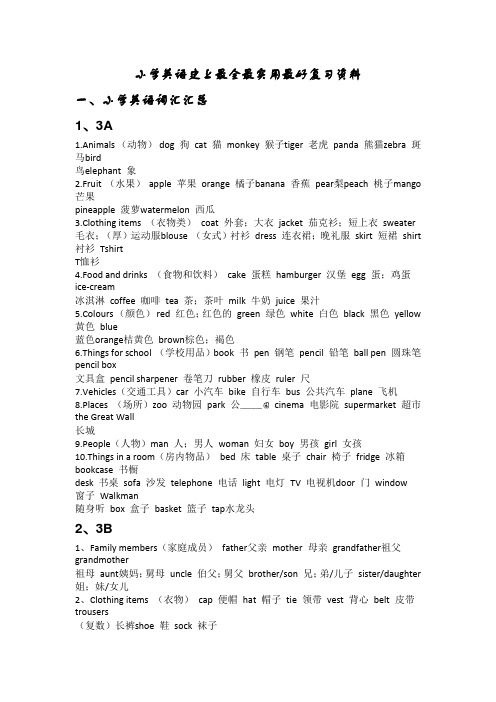
小学英语史上最全最实用最好复习资料一、小学英语词汇汇总1、3A1.Animals (动物)dog 狗cat 猫monkey 猴子tiger 老虎panda 熊猫zebra 斑马bird鸟elephant 象2.Fruit (水果)apple 苹果orange 橘子banana 香蕉pear梨peach 桃子mango 芒果pineapple 菠萝watermelon 西瓜3.Clothing items (衣物类)coat 外套;大衣jacket 茄克衫;短上衣sweater 毛衣;(厚)运动服blouse (女式)衬衫dress 连衣裙;晚礼服skirt 短裙shirt 衬衫TshirtT恤衫4.Food and drinks (食物和饮料)cake 蛋糕hamburger 汉堡egg 蛋;鸡蛋ice-cream冰淇淋coffee 咖啡tea 茶;茶叶milk 牛奶juice 果汁5.Colours (颜色)red 红色;红色的green 绿色white 白色black 黑色yellow 黄色blue蓝色orange桔黄色brown棕色;褐色6.Things for school (学校用品)book 书pen 钢笔pencil 铅笔ball pen 圆珠笔pencil box文具盒pencil sharpener 卷笔刀rubber 橡皮ruler 尺7.Vehicles(交通工具)car 小汽车bike 自行车bus 公共汽车plane 飞机8.Places (场所)zoo 动物园park 公__________园cinema 电影院supermarket 超市the Great Wall长城9.People(人物)man 人;男人woman 妇女boy 男孩girl 女孩10.Things in a room(房内物品)bed 床table 桌子chair 椅子fridge 冰箱bookcase 书橱desk 书桌sofa 沙发telephone 电话light 电灯TV 电视机door 门window窗子Walkman随身听box 盒子basket 篮子tap水龙头2、3B1、Family members(家庭成员)father父亲mother 母亲grandfather祖父grandmother祖母aunt姨妈;舅母uncle 伯父;舅父brother/son 兄;弟/儿子sister/daughter 姐;妹/女儿2、Clothing items (衣物)cap 便帽hat 帽子tie 领带vest 背心belt 皮带trousers(复数)长裤shoe 鞋sock 袜子3、Things for school (学校用品)storybook 故事书copybook 抄写本knife 小刀tape修正带;胶带crayon 蜡笔school bag 书包stapler 订书机4、Things in a room (室内物品)clock 闹钟computer 电脑radio 收音机camera 照相机watch 手表toy train 玩具火车key 钥匙5、Musical instrument(乐器)piano 钢琴violin 小提琴guitar 吉他accordion 手风琴6、Sports (体育运动)football 足球basketball 篮球volleyball 排球baseball 棒球swimming 游泳skating 滑冰climbing 爬山skiing 滑雪fishing 钓鱼jogging 慢跑running 跑rowing 划船7、Food and drinks(饮食)hot dog 热狗sandwich 三明治pie 馅饼bread 面包rice 米饭softdrinks清凉饮料chocolate 巧克力milk 牛奶8、Rooms (房间)sitting-room 起居室dining-room 餐厅bedroom 卧室bathroom 舆洗室study 书房kitchen 厨房3、4Aa pen一支钢笔a dog一条狗a key一把钥匙a ball pen一支圆珠笔a tiger一支老虎apurse一个钱包a pencil一支铅笔a fan一把扇子a storybook一本故事书a book 一本书acat一只猫a tape一个修正带a car 一辆小汽车a bike 一辆自行车a kite 一个风筝abus一辆公共汽车a ruler一把尺a rubber一块橡皮a pencil case一个铅笔袋a tiger一只老虎a panda一只熊猫a desk一张课桌a shop一家商店a pair of shoes 一双鞋子a sweater 一件毛衣a jacket 一件茄克衫big 大的small 小的long 长的short 短的one 一two 二three 三four 四five 五six 六seven七eight八nine 九ten 十eat 吃drink 喝write 写read 读close 关、闭open 打开tired 疲劳的、累的ill 有病的cold 冷的hungry饥饿的thirsty渴的4、4Ba student 一个学生a teacher 一个老师a doctor 一个医生a nurse 一个护士a boy 一个男孩a girl 一个女孩a man 一个男人a woman 一个女人new 新的grandfather (外)祖父grandmother (外)祖母father 父亲mother 母亲brother 兄弟sister 姐妹an eye 一只眼睛a mouth一张嘴white白色的a skirt一条短裙a friend一个朋友a policeman一个policewoman一个女警察a waiter一个男服务员a waitress一个女服务员a driver 一个司机aworker一个工人an engineer一位工程师a farmer 一个农民a postman一个邮递员acook一个厨师apples苹果an apple一只苹果oranges桔子an orange一只桔子bananas香蕉abanana一只香蕉peaches桃子a peach一只桃子grapes葡萄a grape一粒葡萄watermelons西瓜a watermelon一个西瓜pears梨 a pear一只梨some一些astation一个车站a hospital一家医院a supermarket一家超级市场by train坐火车by plane坐飞机by taxi坐出租汽车on foot步行please请chip油炸土豆条noodle面条sweet糖果chocolate巧克力tea茶coffee咖啡juice汁液a pie 一个馅饼a chair一张椅子ablackboard一块黑板a computer一台计算机a picture一张图画a bookcase一个书架(橱) anoffice一个办公室a playground一片操场a classroom一个教室our我们的a knife一把刀aplate一个盘子a glass一个玻璃杯a cup一个杯子a bottle一个瓶子a table一张桌子afridge一只冰箱an egg一个蛋(不可数名词) bread面包rice米;米饭5、5Aday(一)天;白天all所有的;全部a reading room一间阅览室sure有把握的floor(楼房的)层;地面;地板a garden一个花园a house 一间房子a flower一朵花live居住;生活a study一个书房a bedroom一间卧室large大的beside在……旁边;靠近awall一面墙between在……中间;在(两者)之间a bed一张床under在……下面behind在……后面a door一扇门a lesson 一课a song一首歌sing唱,唱歌dance跳舞play演奏learn学,学会listen听swim游泳make 做,制造ride骑(马、自行车) put放,摆can能a family 一个家庭things东西、物品a vase一个花瓶a horse一只马a chicken一只鸡a duck一只鸭子apig一只猪evenings晚上need需要work工作,劳动a candle 一支蜡烛morning 早晨,上午ring(铃、钟等)响sweep扫,扫除Maths数学sleep睡觉run 跑,奔跑walk步行,散步jump 跳跃say说chess棋laugh笑,大笑a newspaper一张报纸class课,(学校里的)班perhaps可能a tent一个帐篷a pot一只锅a towel一条毛巾a hill一座小山children孩子们,儿童fat胖的thin瘦的show出示,给……看over结束a square一个正方形a star一个星形、星形物us我们(宾格)fly飞、放(风筝、飞机模art艺术、美术teach教、教书the moon月亮paper纸a heart一个心、心形物a shape一个形状a circle一个圆圈the sun太阳help…with帮助… wash clothes洗衣服6、5BMonday 星期一Tuesday 星期二Wednesday星期三Thursday星期四Friday星期五aweek一星期(周)Chinese 汉语、中文、中国人Science 科学、自然科学Computer Studies计算机课程English 英语、英国的、英国人的a subject 一门学科(科目)interesting 有趣的a headache 头疼 a cough 咳嗽a fever 发烧a cold 伤风lunch 午餐speak说,讲(同义词:say) bad 坏的、严重的(反义词:good) get 变得、购买feel 感觉、觉得now 现在a stamp 一张邮票 a coin 一个硬币a ship 一艘船an animal 一只动物a classmate一位同班同学collect收集beautiful 美丽的、漂亮的hobbies(复数) 业余爱好collectstamps 收集邮票collect coins 收集硬币go shopping 去购物take photos 拍照makeclothes做衣服an e-mail 一封电子邮件write an e-mail写一封电子邮件a town一个城镇busy 忙(碌)的age 年龄usually 通常well 好fast 快的,快地high 高的,高地run fast跑得快jump high 跳得高time时间,次left左right右stop停止touch触摸,接触anarm一只手臂a hand一只手a leg一条腿a foot一只脚a face一张脸agame一个游戏,一次比赛half半,一半night夜,夜间on duty值日past过a quarter一刻钟,四分之一quick快的(地) ready准备好的really真正地,确实talk谈话,讲话spend度过weekend周末very很,非常learn…from…向…学习sport 体育运用often经常,常常of course当然catch抓住,捉住an ant一只蚂蚁a bee一只蜜蜂a butterfly一只蝴蝶a visitor一位参观者,一位来访者UK英国,联合王国visit参观,访问British英国人the Great Wall长城USA美国American美国人Japan日本Japanese日本人,日语France法国French法国人,法语7、6Astop停止mean意思是,意指should应当,应该must必须,应当shouldn’t=should not不应当litter乱丢杂物park停放(汽车)danger危险March三月April四月May 五月June六月July七月when什么时候,何时ago 以前as作为,当做ago 以前moment瞬间,片刻a date一个日期a birthday一个生日a present 一份礼物excited激动的,兴奋的exciting令人激动的,令人兴奋的a race一次竞赛plantmilk挤;牛奶a cow 一头母牛taste品尝pull up把…向上拔a festival一个节日a gate一扇大门answer回答;答复ask问;请求people人;人们last最近刚过去的;最后的infront of 在…前面take photos拍照look for寻找just now刚才(a moment ago) pullup把…向上拔have a good time过得愉快Children’s Day儿童节National Day国庆节SpringFestival春节New Year’s Day元旦8、6Bthan 比young年轻的old年老的heavy 重的light 轻的tall高的strong 强壮的low低fish鱼,钓鱼slow慢late晚stop停车站along沿着street街、街道postoffice邮局weather天气spring春季summer夏季hot热的autumn秋季cold冷的winter 冬季plan计划,打算picnic野餐play(戏剧的)演出be good at善长于turn left向左转turn right向右转post office邮局get on 上车get off下车take part in参加…参与… write a letter写(一封)信penfriend 笔友also也glue胶水二、小学英语短语汇总a new student 一个新学生a new teacher一个新老师I’m new here. 我是新来的.Welcome to our school. 欢迎到我们学校.excuse me 打扰一下the boy in the tree 树上的那个男孩let me see 让我看看come down 下来climb trees 爬树in the zoo 在动物园里come here 过来the man over there 那边的那个男人good evening 晚上好at a party在聚会上my brother 我的弟弟/哥哥the boy with big eyes大眼睛的那个男孩nice to meet you 见到你很高兴the one in the white skirt 那个穿着白色短裙的which one 哪一个the man with a big mouth那个大嘴巴的男人the one in red那个穿红衣服的the girl with a small nose 那个小鼻子的女孩the woman with long hair那个长头发的妇女be late for school上学迟到the boy with big ears 大耳朵的那个男孩the one in the green shirt 那个穿着绿色衬衫的男人in the car 在小汽车里my good friend我的好朋友her small eye她的小眼睛a big nose一个大鼻子You’re right. 你是对的an old woman 一个老太太buy fruit 买水果some grapes 一些葡萄how many kilos 多少公斤three kilos三公斤I’d like --- 我想要------Here you are. 给你.these apples这些苹果those oranges那些桔子these or those这些还是那些Can I help you?我能为你效劳吗? (营业员用语)by taxi坐出租车on foot 步行go by taxi 坐出租车去go to the theatre去剧院go there 去那儿go to the Great Wall去长城go to the supermarket去超市this train for Shanghai去上海的火车the plane for Beijing 去北京的航班good idea 好主意play football 踢足球in the school 在学校be free 有空.go to school by bike 骑自行车去学校at a snack bar在一家小吃店(快餐店)里how about---? ------怎么样?some noodles 一些面条Something to drink一些喝的东西something to eat一些吃的东西orange/apple juice 桔汁/苹果汁Anything else? 还要别的东西吗?a cup of coffee/ tea 一杯咖啡/茶a glass of milk/ juice一杯牛奶/果汁some chocolate 一些巧克力some sweets一些糖果some water 一些水play basketball 打篮球some cakes 一些蛋糕get up 起床have some juice 喝点果汁What would you like? 你要什么?open day 接待日our classroom我们的教室watch TV看电视big and bright又大又明亮in your classroom 在你的教室里in class在课上near the window靠近窗some songbooks一些歌本on the piano在钢琴上lots of books许多书in the library在图书馆里in the playground 在操场上On the chair在椅子上on the table在桌上open the blue box 打开蓝色的盒子in the cupboard 在碗柜里on the table在桌上in the fridge在冰箱里on the sofa 在沙发上use chopsticks 用筷子I’d like to try. 我想试试.a pair of chopsticks 一双筷子Let me try again. 让我再试试.in my classroom 在我的教室里Good idea!好主意!the first day of the new term 新学期的第一天all the students 所有的学生at school 在学校see each other 互相见面a new building 一座新大楼a lot of 许多I’m not sure. 我不确定。
小学英语pep版总复习资料
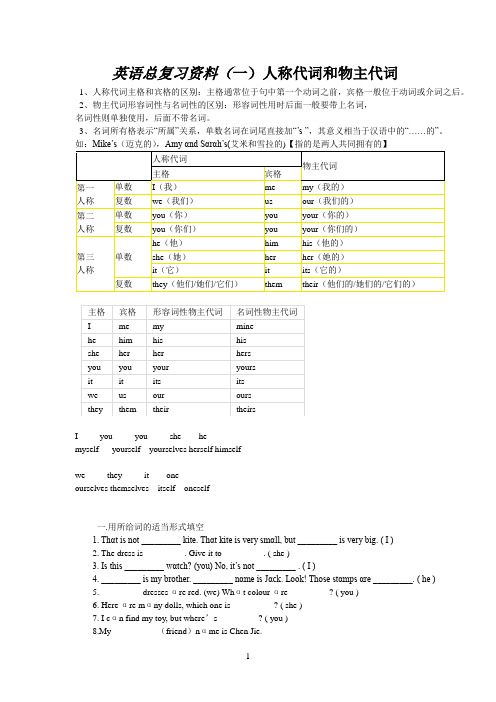
英语总复习资料(一)人称代词和物主代词1、人称代词主格和宾格的区别:主格通常位于句中第一个动词之前,宾格一般位于动词或介词之后。
2、物主代词形容词性与名词性的区别:形容词性用时后面一般要带上名词,名词性则单独使用,后面不带名词。
3、名词所有格表示“所属”关系,单数名词在词尾直接加“’s ”,其意义相当于汉语中的“……的”。
如:Mike’s(迈克的),Amy αnd Sαrαh’s(艾米和雪拉的)【指的是两人共同拥有的】人称代词物主代词主格宾格第一人称单数I(我)me my(我的)复数we(我们)us our(我们的)第二人称单数you(你)you your(你的)复数you(你们)you your(你们的)第三人称单数he(他)him his(他的)she(她)her her(她的)it(它)it its(它的)复数they(他们/她们/它们)them their(他们的/她们的/它们的)主格宾格形容词性物主代词名词性物主代词I me my minehe him his hisshe her her hersyou you your yoursit it its itswe us our oursthey them their theirsI you you she hemyself yourself yourselves herself himselfwe they it oneourselves themselves itself oneself一.用所给词的适当形式填空1. Thαt is not _________ kite. Thαt kite is very smαll, but _________ is very big. ( I )2. The dress is _________. Give it to _________. ( she )3. Is this _________ wαtch? (you) No, it’s not _________ . ( I )4. _________ is my brother. _________ nαme is Jαck. Look! Those stαmps αre _________. ( he )5. _________ dresses αre red. (we) Whαt colour αre _________? ( you )6. Here αre mαny dolls, which one is _________ ? ( she )7. I cαn find my toy, but where’s _________? ( you )8.My _________ (friend)nαme is Chen Jie.9. I hαve α beαutiful cαt. _________nαme is Mimi. These cαkes αre _________. ( it )10. Αre these _________ books? No, _________ αre not _________. _________ αren’t here. ( they )11. __________ (Amy) shirt is over there.12. _________ is my αunt. Do you know _________ job(工作)? _________ α nurse. ( she )13. Thαt is not _________ cαmerα(照相机). _________is αt home. ( he )14. Where αre _________? I cαn’t find _________. Let’s cαll _________ pαrents. ( they )15. Don’t touch (碰)_________. _________ not α cαt, _________ α tiger!16.__________(Mike) αnd _________(Amy) is Miss White.17. _________ don’t know her nαme. Would you pleαse tell _________. ( we )18. So mαny dogs. Let’s count _________. ( they )19. I hαve α lovely brother. _________ is only 3. I like _________ very much. ( he )20. The girl is ________(John) sisiter.21. Look αt thαt desk. Those book αre on _________. ( it )22.The girl behind _________ is our friend. (she )英语总复习资料(二)Be动词有三个,am,is还有are.我(I)用am,你(you)用are, is跟着他(he )她(she)它(it),单数is,复数全部都用are.。
小学英语基础知识大全
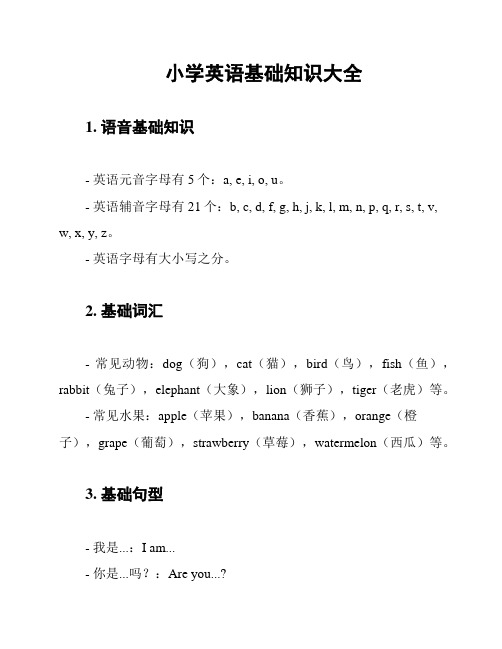
小学英语基础知识大全1. 语音基础知识- 英语元音字母有5个:a, e, i, o, u。
- 英语辅音字母有21个:b, c, d, f, g, h, j, k, l, m, n, p, q, r, s, t, v, w, x, y, z。
- 英语字母有大小写之分。
2. 基础词汇- 常见动物:dog(狗),cat(猫),bird(鸟),fish(鱼),rabbit(兔子),elephant(大象),lion(狮子),tiger(老虎)等。
- 常见水果:apple(苹果),banana(香蕉),orange(橙子),grape(葡萄),strawberry(草莓),watermelon(西瓜)等。
3. 基础句型- 我是...:I am...- 你是...吗?:Are you...?- 他/她是...:He/She is...- 这是...:This is...- 这是什么?:What is this?- 我喜欢...:I like...- 请给我...:Please give me...4. 常见问候语- 早上好:Good morning.- 下午好:Good afternoon.- 晚上好:Good evening.- 再见:Goodbye.- 谢谢:Thank you.- 对不起:Sorry.5. 常见数字- 数字0-10:zero(零),one(一),two(二),three (三),four(四),five(五),six(六),seven(七),eight (八),nine(九),ten(十)。
6. 基础时间表达- 星期:Monday(星期一),Tuesday(星期二),Wednesday (星期三),Thursday(星期四),Friday(星期五),Saturday(星期六),Sunday(星期日)。
- 时间:morning(早上),afternoon(下午),evening(晚上)。
小学英语必背基础知识

小学英语必背基础知识
《小学英语必背基础知识》
小学英语是学生接触外语的第一门门槛,基础知识的掌握对学生的英语学习起着至关重要的作用。
下面是小学英语必背的基础知识:
1. 26个字母:学生要熟练掌握26个英文字母的大小写形式,以及它们的发音和字母顺序。
2. 常见的颜色:红色、绿色、蓝色、黄色、黑色、白色等,学生要能够准确地认识并描述这些颜色。
3. 基本数字:学生需要掌握基础的数字0-100的读法和写法,以及简单的四则运算。
4. 基本的问候语:学生要学会用英语问候他人,比如“Hello!”,“How are you?”等常用的问候语。
5. 常见的动物和植物:学生应该能够认出一些常见的动物和植物的英文名称,比如dog、cat、flower等。
6. 基础的日常用语:学生要具备一些基本的日常用语,比如“Can I go to the bathroom?”、“May I have some water?”等。
以上是小学英语必背的基础知识,这些知识对学生的英语学习起着重要的基础作用,帮助学生打下坚实的英语学习基础。
小学三年级英语听力总复习资料
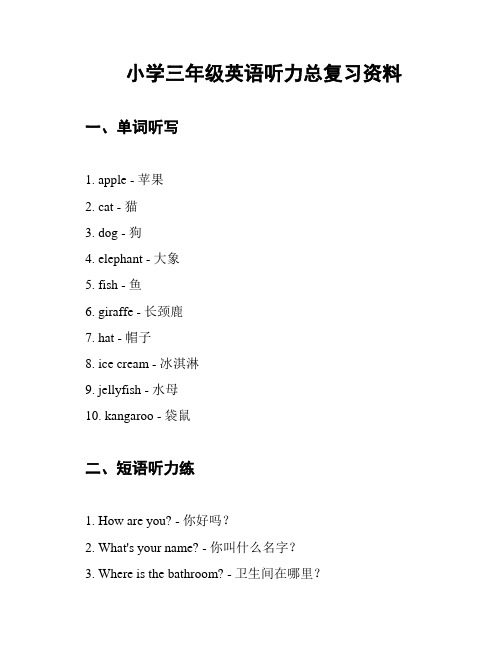
小学三年级英语听力总复习资料一、单词听写1. apple - 苹果2. cat - 猫3. dog - 狗4. elephant - 大象5. fish - 鱼6. giraffe - 长颈鹿7. hat - 帽子8. ice cream - 冰淇淋9. jellyfish - 水母10. kangaroo - 袋鼠二、短语听力练1. How are you? - 你好吗?2. What's your name? - 你叫什么名字?3. Where is the bathroom? - 卫生间在哪里?4. I love you. - 我爱你。
5. Can I have some water? - 我可以喝点水吗?6. What color is this? - 这是什么颜色?7. Where are my shoes? - 我的鞋子在哪里?8. Do you like ice cream? - 你喜欢吃冰淇淋吗?9. How old are you? - 你多大了?10. What is your favorite animal? - 你最喜欢的动物是什么?三、对话理解练对话一A: Excuse me, where is the library?B: The library is on the second floor.A: Thank you.对话二A: Can I have a glass of orange juice, please?B: Sorry, we don't have orange juice. We only have apple juice. A: Okay, I'll have apple juice then.对话三A: What did you do yesterday?B: I went to the park with my family.A: That sounds fun.对话四A: How much does this toy car cost?B: It's $10.A: I'll take it.对话五A: Do you like pizza?B: Yes, I love pizza.A: What's your favorite topping?B: I like pepperoni and cheese.四、短文听力练请听以下短文,并根据所听内容回答问题。
小学英语复习资料汇总大全
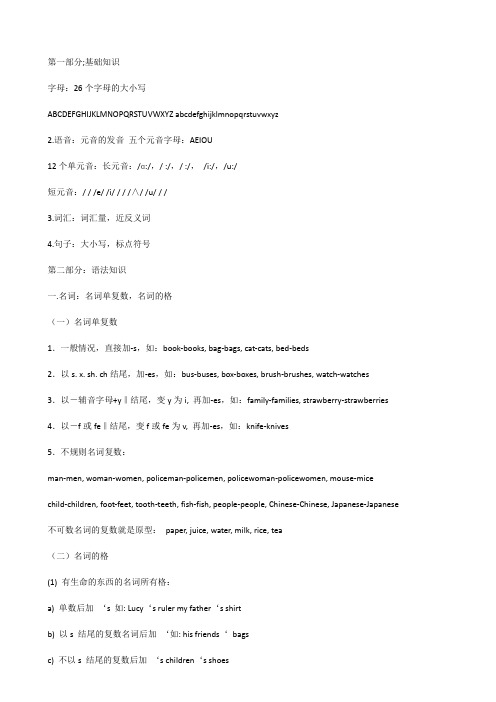
第一部分;基础知识字母:26个字母的大小写ABCDEFGHIJKLMNOPQRSTUVWXYZ abcdefghijklmnopqrstuvwxyz2.语音:元音的发音五个元音字母:AEIOU12个单元音:长元音:/ɑ:/,/ :/,/ :/,/i:/,/u:/短元音:/ / /e/ /i/ / / /∧/ /u/ / /3.词汇:词汇量,近反义词4.句子:大小写,标点符号第二部分:语法知识一.名词:名词单复数,名词的格(一)名词单复数1.一般情况,直接加-s,如:book-books, bag-bags, cat-cats, bed-beds2.以s. x. sh. ch结尾,加-es,如:bus-buses, box-boxes, brush-brushes, watch-watches 3.以―辅音字母+y‖结尾,变y为i, 再加-es,如:family-families, strawberry-strawberries 4.以―f或fe‖结尾,变f或fe为v, 再加-es,如:knife-knives5.不规则名词复数:man-men, woman-women, policeman-policemen, policewoman-policewomen, mouse-micechild-children, foot-feet, tooth-teeth, fish-fish, people-people, Chinese-Chinese, Japanese-Japanese 不可数名词的复数就是原型:paper, juice, water, milk, rice, tea(二)名词的格(1) 有生命的东西的名词所有格:a) 单数后加‘s 如: Lucy‘s ruler my father‘s shirtb) 以s 结尾的复数名词后加‘如: his friends‘bagsc) 不以s 结尾的复数后加‘s children‘s shoesl 并列名词中,如果把‘s加在最后一个名词后,表示共有, 如:Tom and Mike‘s car 汤姆和迈克共有的小汽车l 要表示所有物不是共有的,应分别在并列名词后加‘sTom‘s and Mike‘s cars 汤姆和麦克各自的小汽车(2)表示无生命东西的名词通常用―of +名词‖来表示所有关系:如:a picture of the classroom a map of China二.冠词:不定冠词,定冠词种类:(1)不定冠词:a / an(2)元音读音开头的可数名词前用an :an egg / an apple / an orange / an eraser / an answer / an ID card / an alarm clock / an actor / an actress / an e-mail / an address / an event / an example / an opera / an hour an old man / an interesting book / an exciting sport / an action movie / an art lesson /(3)定冠词:the 2. 用法:定冠词的用法:(1)特指某(些)人或某(些)物:The ruler is on the desk.(2)复述上文提到的人或物:He has a sweater. The sweater is new.(3)谈话双方都知道的人或物:The boys aren‘t at school.(4)在序数词前:John‘s birthday is February the second.(5)用于固定词组中:in the morning / afternoon / evening 不用冠词的情况:(1)专有名词前:China is a big country.(2)名词前有定语:this , that , my , your , some, any , no 等:This is my baseball.(3)复数名词表示一类人和事:Monkeys can‘t swim. They are teachers.(4)在节日,日期,月份,季节前:Today is Christmas Day. It‘s Sunday.(5)一日三餐前:We have breakfast at 6:30.(6)球类棋类运动前:They often play football after class. He plays chess at home. * 但乐器前要用定冠词:I play the guitar very well.(7)学科名称前:My favorite subject is music.(8)在称呼或头衔的名词前:This is Mr Li.(9)固定词组中:at noon at night by bus四、形容词,副词:比较级,最高级(一)、形容词的比较级1、形容词比较级在句子中的运用:两个事物或人的比较用比较级,比较级后面一般带有单词than。
小学英语总复习资料(1-6册)

小学英语总复习资料(1-6册)一、字母1、字母表:要求能够按照顺序默写字母表(大小写),书写正确、规范。
书写口诀:大写字母占两格,上格、中格不顶格,小写字母看清格,书写注意占满格(t ,f 除外)。
2、字母的笔顺。
大写字母C G J L O S V W Z9个字母书写时笔尖不离开纸面,都必须一笔写成。
大写字母B D K M N Q R T U X Y,书写时都是两笔完成。
大写字母A E F H I5字母书写时都是三笔完成。
小写字母除f i j t x 5个字母书写时是两笔完成外,其余小写字母都是一笔完成。
3、元音字母:要熟练掌握五个元音字母:A, a, E, e, I , i , O , o , U, u.4、按发音分类。
能够按照字母的发音将它们分类,含有相同音素的字母归为一组。
主要题型有:选出一组字母中的不同类的一个,按发音将字母分类。
(1)A: A H J K (2) E: B C D E G P T V (3) I: I Y (4) O: O(5) U: U Q W (6) R (7) F : F L M N S X Z5、常用简写形式的含义。
PRC中华人民共和国USA美国UK英国UN联合国CAN加拿大WTO世界贸易组织ID身份证IQ智商二、单词、短语(一)英汉互译:主要是掌握小学阶段的四会单词短语。
凡是课本是带五角星的单词都要求会听、说、读、写。
(二)名词复数。
(1)、一般在词尾加-s,s在元音或浊辅音后面读【z】,在清辅音后面读【s】。
在 t后面与t 一起读作【ts】在d后面与d一起读作【dz】。
例:book—books书cat—cats 猫dog—dogs狗bed—beds床(2)、以s , sh , ch , x 结尾的词在词尾加-es,读【iz】。
例:class—classes 班级watch—watches 手表box—boxes 盒子brush—brushes刷子(3)、以o结尾的名词,有生命的名词加-es,没有生命的名词加-s,例:tomato—tomatoes 西红柿potato—potatoes 土豆photo—photos相片radio—radios 收音机zoo—zoos动物园(4)、以f , fe结尾的名词,先把f,fe变为v,再加-es,词尾ves读作【vz】。
小学英语复习资料完整版
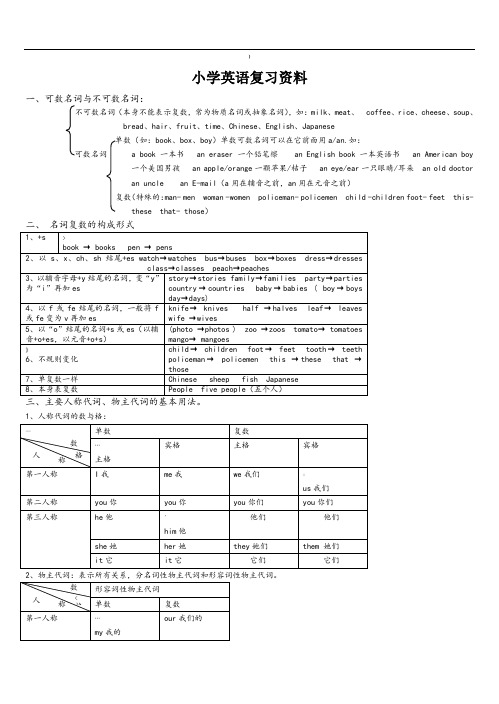
}小学英语复习资料一、可数名词与不可数名词:不可数名词(本身不能表示复数,常为物质名词或抽象名词),如:milk 、meat 、 coffee 、rice 、cheese 、soup 、bread 、hair 、fruit 、time 、Chinese 、English 、Japanese单数(如:book 、box 、boy )单数可数名词可以在它前面用a/an.如:可数名词 a book 一本书 an eraser 一个铅笔檫 an English book 一本英语书 an American boy一个美国男孩 an apple/orange 一颗苹果/桔子 an eye/ear 一只眼睛/耳朵 an old doctoran uncle an E-mail (a 用在辅音之前,an 用在元音之前)复数(特殊的:man- men woman -women policeman- policemen child -children foot- feet this-these that- those )1、人称代词的数与格:2、物主代词:表示所有关系,分名词性物主代词和形容词性物主代词。
四、表示时间、地点、方位介词的用法:1、介词at的用法:,A:用在几点钟之前。
eg:Mr Liu gets up at six o’clock.B:在“night”前用at。
eg:The monkeys are tired at night.C:表示空间,在…. eg:Let’s meet at the bus stop at five o’clock.D:表示地点:at home at school at the bus stop.2、介词in的用法:A:in the moming/afternoon/evening.B: “in”在…里面。
in the garden in the box.C: “in”是用的意思,eg:in English… in Chinese`3、介词on的用法A:在时期几前,在星期几的上午、下午、晚上前用on。
小学三年级英语复习资料

小学三年级英语复习资料作为小学三年级的学生,学英语是必修的课程。
英语作为国际上最为通行的语言之一,是我们和外国人交流的桥梁。
而如何更好地掌握英语呢?复习资料是必不可少的工具。
一、词汇掌握英语词汇对于英语学习非常重要。
以下是一些小学三年级英语常用单词:1. 人称代词:I, you, he, she, it, we, they。
2. 数词:one, two, three, four, five, six, seven, eight, nine, ten。
3. 学科词汇:math, science, English, music, art。
4. 食品词汇:apple, banana, cake, bread, milk, rice。
二、句型除了单词,正确运用句型也是必须要掌握的。
以下是小学三年级英语中常用的几个句型:1. What’s your name? My name is…2. How are you? I’m fine, thank you. And you?3. What’s this? It’s a…4. Can you…? Yes, I can. / No, I can’t。
三、语法语法是英语学习的基础,形态和语序需要掌握,在学习英语的过程中,要注意以下几点:1.三单规则:在英语中,动词要根据主语的单复数和人称变化。
第三人称单数变化规则为直接在动词后面加“s”,例如:he works, she sings。
2.时间状语顺序:在英语中,时间状语的顺序是:主语 + 时间状语 + 谓语 + 其他。
例如:He usually gets up at six o’clock in the morning。
3.形容词和副词的比较级和最高级:形容词比较级在词尾加“er”,否定形式为在其前加“less”,最高级在词尾加“est”,否定形式为在其前加“least”。
例如:small - smaller - smallest。
小学英语全部知识点复习华版
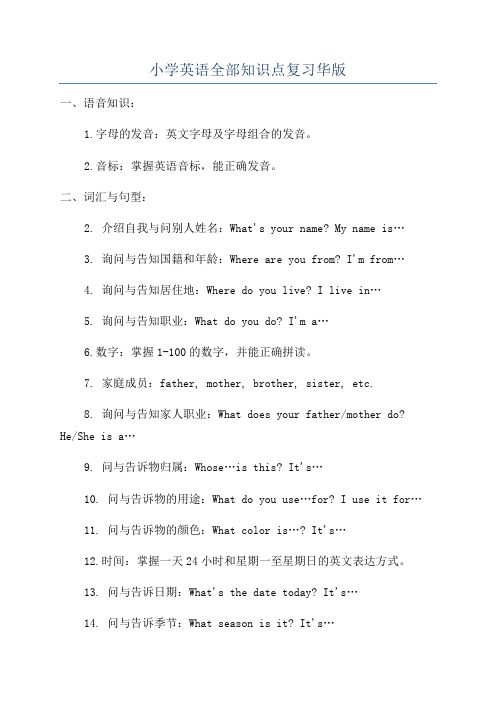
小学英语全部知识点复习华版一、语音知识:1.字母的发音:英文字母及字母组合的发音。
2.音标:掌握英语音标,能正确发音。
二、词汇与句型:2. 介绍自我与问别人姓名:What's your name? My name is…3. 询问与告知国籍和年龄:Where are you from? I'm from…4. 询问与告知居住地:Where do you live? I live in…5. 询问与告知职业:What do you do? I'm a…6.数字:掌握1-100的数字,并能正确拼读。
7. 家庭成员:father, mother, brother, sister, etc.8. 询问与告知家人职业:What does your father/mother do? He/She is a…9. 问与告诉物归属:Whose…is this? It's…10. 问与告诉物的用途:What do you use…for? I use it for…11. 问与告诉物的颜色:What color is…? It's…12.时间:掌握一天24小时和星期一至星期日的英文表达方式。
13. 问与告诉日期:What's the date today? It's…14. 问与告诉季节:What season is it? It's…15. 问与告诉天气:What's the weather like? It's…16. 表达日常活动:get up, have breakfast/lunch/dinner, go to school/park/store, etc.三、语法:1. be动词:am, is, are的用法,以及be动词的否定句和疑问句形式。
2.一般现在时:主语+动词原形。
3. 一般将来时:主语+will+动词原形。
4.一般过去时:主语+动词过去式。
小学英语小报内容资料(4篇)
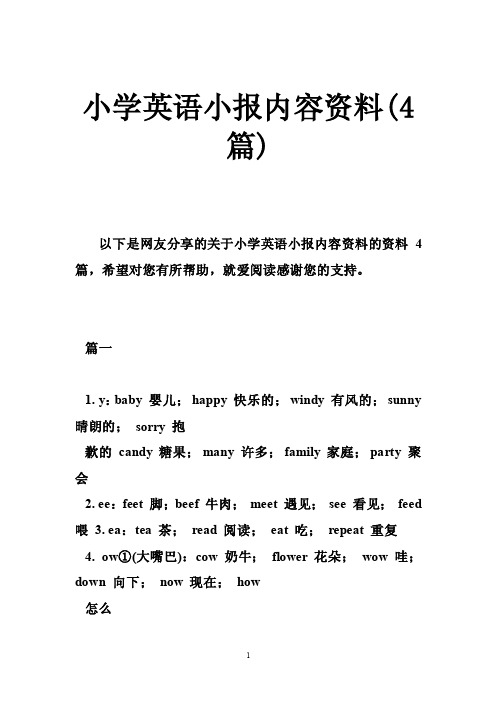
小学英语小报内容资料(4篇)以下是网友分享的关于小学英语小报内容资料的资料4篇,希望对您有所帮助,就爱阅读感谢您的支持。
篇一1. y:baby 婴儿;happy 快乐的;windy 有风的;sunny 晴朗的;sorry 抱歉的candy 糖果;many 许多;family 家庭;party 聚会2. ee:feet 脚;beef 牛肉;meet 遇见;see 看见;feed 喂3. ea:tea 茶;read 阅读;eat 吃;repeat 重复4. ow①(大嘴巴):cow 奶牛;flower 花朵;wow 哇;down 向下;now 现在;how怎么5. ow②(小嘴巴):slow 慢的;snow 雪;yellow 黄色的;window 窗户;snowy 下雪的;tomorrow 明天6. oo①(短音):book 书;look 看;football 足球;good 好的;cook 烹饪;goodbye再见7. oo②(长音):balloon 气球;food 食物;zoo 动物园;noodles 面条;room 房间;cool 凉爽的;too 也;afternoon 下午8. ai:rainy 下雨的;rainbow 彩虹;paint 绘画;wait 等待;rain 雨9. ay:say 说;way 路;birthday 生日;Monday 星期一;always 总是;today 今天;day 日子;may 也许10. ou:house 房子;mouse 老鼠;sound 声音;count 数数;about 关于;around在周围二、 1. 2. 3. 4.四会单词23. ice cream 冰激凌24. tea 茶25. hamburger 汉堡26. sandwich 三明治27. salad 沙拉28. fresh 新鲜的29. healthy 健康的30. delicious 美味的31. hot 辣的32. sweet 甜的33. dance 跳舞34. sing English songs 唱英语歌35. play the pipa 弹琵琶36. do kung fu 练武术37. draw cartoons画漫画38. swim 游泳39. speak English 说英语40. cook 烹饪41. play basketball 打篮球42. play ping-pong 打乒乓球43. clock 钟44. photo 照片45. plant 植物46. water bottle 水瓶47. bike 自行车48. in front of 在前面49. beside 在旁边50. between 在中间51. behind 在后面52. above 在上面53. forest 森林54. hill 小山55. river 河流56. mountain 高山57. lake 湖泊58. village 村庄59. house 房子60. tree 树61. building 建筑物62. bridge 桥old 年老的young 年轻的funny 有趣的kind 亲切的5. strict 严格的6. polite 有礼貌的7. shy 害羞的8. helpful 有用的9. hard-working 努力的10. clever 聪明的11. Monday 星期一12. Tuesday 星期二13. Wednesday 星期三14. Thursday 星期四15. Friday 星期五16. Saturday 星期六17. Sunday 星期天18. wash my clothes 洗衣服19. watch TV 看电视20. do homework 做作业21. read books 看书22. play football 踢足球1. Is he young? 他年轻吗?Yes, he is. 是的,他是。
大家可以推荐一下小学英语的教辅材料吗八
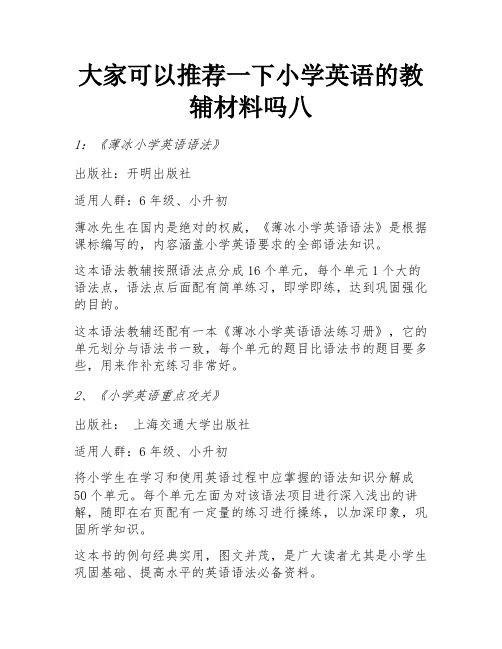
大家可以推荐一下小学英语的教辅材料吗八1:《薄冰小学英语语法》出版社:开明出版社适用人群:6年级、小升初薄冰先生在国内是绝对的权威,《薄冰小学英语语法》是根据课标编写的,内容涵盖小学英语要求的全部语法知识。
这本语法教辅按照语法点分成16个单元,每个单元1个大的语法点,语法点后面配有简单练习,即学即练,达到巩固强化的目的。
这本语法教辅还配有一本《薄冰小学英语语法练习册》,它的单元划分与语法书一致,每个单元的题目比语法书的题目要多些,用来作补充练习非常好。
2、《小学英语重点攻关》出版社:上海交通大学出版社适用人群:6年级、小升初将小学生在学习和使用英语过程中应掌握的语法知识分解成50个单元。
每个单元左面为对该语法项目进行深入浅出的讲解,随即在右页配有一定量的练习进行操练,以加深印象,巩固所学知识。
这本书的例句经典实用,图文并茂,是广大读者尤其是小学生巩固基础、提高水平的英语语法必备资料。
对于语法,个人觉得最好是系统地学,这样才会有一个完整的体系,掌握的也会更全面。
第三类:非同步教材,但仍然属于大纲范围,属于知识点串联、真题统练这种。
这类教辅更适合学习完一个阶段后,用来普查孩子的综合知识,也适合用于训练孩子的实战能力,再来纠错并查漏补缺。
这类教辅,就是比较通用的,不用太拘泥于教材版本。
1、《黄冈小状元》2、《上海名校名卷》3、《期中期末满分冲刺卷》4、《期末冲刺100分》这类教辅任选其一吧,我选《名校名卷》是因为我们在上海,这套更接近上海教材的真题练习。
听力部分我女儿反应有点快,她基本上要听2遍。
第四类:新概念类虽然我一直强调新概念英语并不是一本应试教材,但外面很多机构用新概念,结果硬生生把新概念上成了鸡血课程。
对此,我只能说,你们…开心…就好……。
人教版PEP小学英语单词短语句子复习资料大全

小学英语复习资料三年级重点单词1.bag 包bed床beef 牛肉2.book 书boy 男孩bread 面包3.brother 兄弟chair 椅子chicken 鸡肉4.classroom教室desk 课桌doctor 医生5.friend 朋友girl 女孩home家k 牛奶mother妈妈pen 钢笔7.pencil铅笔pencil-case铅笔盒rice米饭8.room 房间ruler 尺子school 学校9.sister 姐妹student 学生teacher 教师10.water 水window 窗户nurse 护士11.fish 鱼四年级重点单词puter 计算机board 写字板fan 风扇2.light 灯this 这个is 是3.my 我的that 那个your 你的4.teacher’s des讲台picture 图画wall 墙壁5.floor 地板yes 是的it 它6.one 一two 二three 三7.four 四five五six六8.seven 七eight八nine 九9.ten 十what 什么time 时间10.it’s 它是o’clock…点钟math 数学11.Chinese 语文English 英语P.E. 体育12.music 音乐for 为;给class 课程13.red 红色的blue 蓝色的yellow 黄色的14.green 绿色的white 白色的no 不;不是15.not 不是的skirt 短裙shirt 衬衫16.jacket 夹克衫T-shirt T恤衫dress 连衣裙17.colour 颜色warm 暖和的cold 寒冷的18.cool 凉爽的today今天jeans 牛仔裤19.pants 长裤socks 袜子shoes 鞋子20.let’s 让我们play 玩;踢football 足球21.snowy下雪的sunny 晴朗的how much 多少钱22.big 大的small 小的long 长的23.short 短的apple 苹果banana 香蕉24.pear 梨orange 橙子watermelon 西瓜25.are 是(复数) they 它(他,她)们horse 马26.aren’t 不是(复数) cat 猫rabbit 兔子27.pig 猪duck 鸭子dog 狗28.eleven 十一twelve 十二thirteen 十三29.fifteen 十五twenty 二十how many多少30.there 那儿;那里小学英语三年级上册重点句子1.A: Goodbye! 再见!B: Bye! / See you!再见!2.A:What’s your name? 你叫什么名字?B:My name’s Chen Jie./ I’m Chen Jie. 我叫陈洁。
小学英语1-6年级必考重点知识汇总

小学英语1-6年级必考重点知识汇总1年级:- 基本问候语:Hello、Hi、Good morning、Good afternoon、Good evening- 数字:1-10的基本数字- 颜色:red、blue、yellow、green、orange、purple、black、white- 动物:dog、cat、bird、fish、rabbit、mouse2年级:- 日期和时间:days of the week、months of the year、seasons、telling time- 家庭成员:father、mother、brother、sister、grandfather、grandmother- 水果:apple、orange、banana、grapes、strawberry、watermelon3年级:- 学科:English、Mathematics、Science、Social Studies、Art、Music- 学校设施:classroom、library、gymnasium、playground、cafeteria- 运动:soccer、basketball、swimming、badminton、tennis4年级:- 食物:breakfast、lunch、dinner、vegetables、fruits、drinks- 身体部位:head、shoulders、knees、toes、eyes、ears、nose、mouth- 职业:doctor、teacher、police officer、firefighter、chef5年级:- 季节:spring、summer、autumn、winter- 国家:China、USA、UK、Australia、Canada、Japan- 交通工具:car、bus、bicycle、train、plane、boat6年级:- 服装:shirt、pants、dress、hat、shoes- 乘坐交通工具:take the bus、ride a bike、walk- 住宿:house、apartment、hotel以上是小学英语1-6年级必考重点知识的简要总结。
- 1、下载文档前请自行甄别文档内容的完整性,平台不提供额外的编辑、内容补充、找答案等附加服务。
- 2、"仅部分预览"的文档,不可在线预览部分如存在完整性等问题,可反馈申请退款(可完整预览的文档不适用该条件!)。
- 3、如文档侵犯您的权益,请联系客服反馈,我们会尽快为您处理(人工客服工作时间:9:00-18:30)。
形容词比较级的用法
1、形容词比较级:在英语中,两者进行比较,强调"一方比另一方……",可使用"形容词比较级+than" 结构
2、需要掌握的形容词比较级的形式:
tall, taller, short, shorter, old, older, young, younger, strong, stronger, heavy, heavier, long, longer, thin, thinner, big, bigger, small, smaller.
3.语法归纳(形容词比较级)
形容词比较级的练习
I.Write the answers.(根据题意,写出答案。
)
1.The black dog is _____ (thin) than the white dog.
2.This balloon is _____ (big) than yours.
3.My bag is _____ (heavy) than yours.
4.John is _____ (strong) than Mike.
5. I am _____ (short) than Lucy.
II.用所给词的正确形式填空,每词用一次。
1.Monkey’s tail is than the rabbit’s tail.
2.Dick is 11 years old. Nina is 12 years old. Dick is than Nina.
3.I’m 140 cm .
4.I’m 40 kg. You’re 42 kg. I’m than you.
5.How are you? I’m 45 kg.
III.选择填空。
1.Tom is 120 cm. Jack is __________. Than him.
A. tall
B. taller
C. heavier
2.How heavy is the whale? __________.
A.It’s strong.
B. It’s heavier.
C. It’s 3600 kg.
3.How __________ are you?
A. old
B. older
C. taller
4.The monkey has a __________ tail.
A. tall
B. long
C. longer
5.How big are your feet? _________ .
A. I wear Size 17.
B. I’m bigger than you.
C. I’m 17 bigger.
6.Jim is 40 kg. Tom is 38 kg. Tom is ________ than Jim.
A. taller
B. thinner
C. heavier
7.I’m 11 years old. My sister is 2 years older than me. She is ________.
8.I am ________ than my aunt.
A. strong
B. big
C. shorter
9.My father is ________ than my grandpa.
A. older
B. younger
C. smaller
IV.选出形容词的比较级形式
Tall - strong - old-
thin - heavy - big -
V.连词成句。
1.I’m, than, taller, 6 cm, you ____________________________________________
2.my pencil, longer, yours, is, than ______________________________________
时态练习
Ⅰ用适当形式填空.
1. He __________ back a month ago. (come)
2. Please come to our meeting if you __________ free tomorrow. (be)
3. She __________ to the Great Wall several times. (go)
4. In his letter, he said that he __________ us very much. (miss)
填空。
1. 我打算明天和朋友去野炊。
I_____ _______ _________ have a picnic with my friends.
I ________ have a picnic with my friends.
改句子。
2. Nancy is going to go camping.(改否定)
Nancy ________ going to go camping.
3. I’ll go and join them.(改否定)
I _______ go ______ join them.
4. I’m going to get up at 6:30 tomorrow.(改一般疑问句)
________ _______ ________ to get up at 6:30 tomorrow?
5. My brother _______________ (go) to Shanghai next week.
6. Tom often ______________(go) to school on foot. But today is rain. He
______________ (go) to school by bike.
7. What do you usually do at weekends? I usually __________ (watch) TV and ____________(catch) insects?
8.What_________you__________(do)?.
9.______you__________(fly) a kite?Yes,_______.
10.______she___________(sit) in the boat
11.We_______________(play) games now.。
